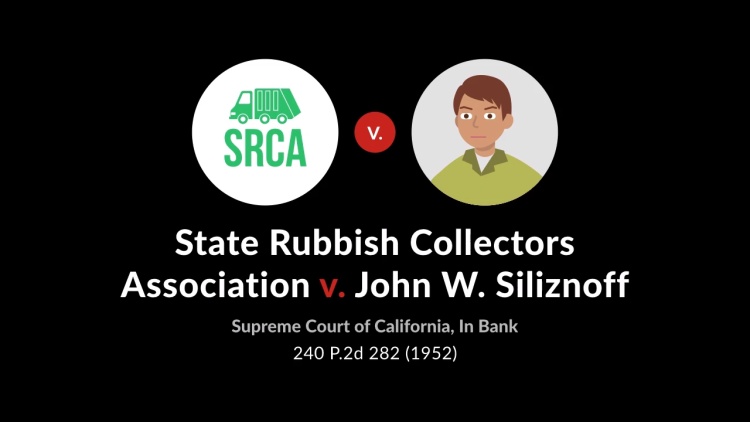State Rubbish Collectors Association v. Siliznoff
Supreme Court of California
38 Cal. 2d 330, 240 P.2d 282 (1952)
- Written by Michael Beverly, JD
Facts
John Siliznoff (defendant), a trash collector, collected trash from Acme Brewing Company (Acme). State Rubbish Collectors Association (Association)(plaintiff) regarded Acme as being within the pickup territory of Mike Abramoff, another member of the Association. The Association called Siliznoff and ordered him to give the money he collected from Acme to Abramoff. Siliznoff signed notes requiring Siliznoff to pay Abramoff in this regard. An inspector for the Association threatened to beat up Siliznoff, cut up his truck tires, and put him out of business if he did not make arrangements to pay Abramoff before the Association’s board meeting. Siliznoff attended the board meeting and protested that he owed nothing and told the Association he could not pay what he owed. The president of the Association told Siliznoff that the board controlled trash collection within the city. After two hours Siliznoff agreed to join the Association and pay for the Acme account, and signed notes indicating such. Siliznoff was so frightened from what occurred during the dispute that he became ill, vomited several times, and missed work for several days. The Association sued Siliznoff to collect on the notes, and Siliznoff filed a counterclaim seeking cancellation of the notes because of duress and lack of consideration. Siliznoff also sought general and punitive damages for the alleged assaults made by the Association. The jury returned a verdict in favor of Siliznoff on all claims. The Association appealed to the Supreme Court of California.
Rule of Law
Issue
Holding and Reasoning (Traynor, J.)
What to do next…
Here's why 906,000 law students have relied on our case briefs:
- Written by law professors and practitioners, not other law students. 47,100 briefs, keyed to 996 casebooks. Top-notch customer support.
- The right amount of information, includes the facts, issues, rule of law, holding and reasoning, and any concurrences and dissents.
- Access in your classes, works on your mobile and tablet. Massive library of related video lessons and high quality multiple-choice questions.
- Easy to use, uniform format for every case brief. Written in plain English, not in legalese. Our briefs summarize and simplify; they don’t just repeat the court’s language.





